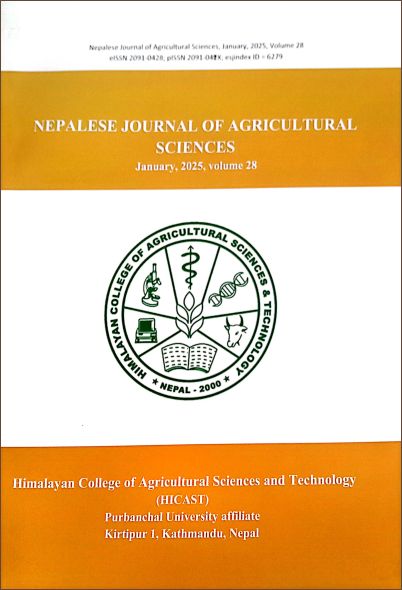Effect of Rates of Cow Dung and NPK on the Growth and Yield of Cucumber (Cucumis sativus) in Southern Guinea Savanna, Nigeria
DOI:
https://doi.org/10.3126/nepjas.v28i1.77615Keywords:
Cow Dung, Cucumber, Growth, NPK, YieldAbstract
This study evaluates the effects of various application rates of cow dung and NPK fertilizer on the growth and yield of cucumber (Cucumis sativus) in the Southern Guinea Savanna region. The experiment was laid in a Randomized Complete Block Design (RCBD), the experimental treatment included five levels of cow dung (control, 3, 6, 9 and 12tons/ha) and five levels of NPK fertilizer (control, 50, 100, 150 and 200 kg/ha) with three replications. Data were collected on growth attributes such as vine length, leaf area, number of branches, and on fruit characteristics such as number for fruits, fruit length, fruit diameter and fruit yield. Results indicated that the application of NPK at 200 kg/ha significantly enhanced most growth parameters, including vine length, leaf area, and fruit yield, owing to the immediate nutrient availability it provides. Cow dung, particularly at 12 tons/ha, also positively influenced growth and yield, though its effects were more gradual due to its slower nutrient release. The study concludes that while NPK fertilizer offers rapid growth and yield improvements, cow dung presents a sustainable alternative by enhancing soil fertility and supporting long-term productivity. Recommendations suggest a balanced application of both NPK and cow dung to optimize cucumber growth while maintaining soil health.




